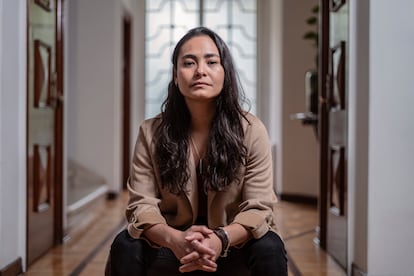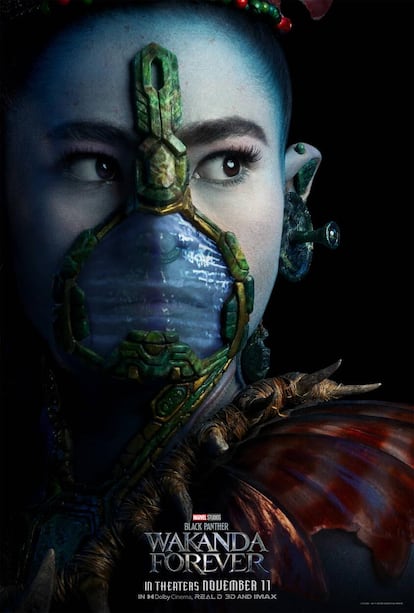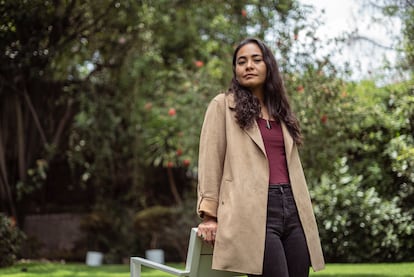Mabel Cadena: ‘I was told that people of color would never be superheroes’
The Mexican actress stars in ‘Black Panther: Wakanda Forever,’ the Marvel Cinematic Universe’s latest film, which opens on November 11


In the 1947 comic Namora, the daughter of an Atlantean and a human is a superheroine who can fly and also swims at incredible speeds; she possesses indefatigable strength and has bulletproof skin. Three-quarters of a century later, the character retains the blueness of her marine skin, but unlike the original comic, Namora is not the daughter of a Caucasian woman. Mexican actress Mabel Cadena plays the sea goddess in Black Panther: Wakanda Forever, the Marvel Cinematic Universe’s next film, which is on general release from November 11.
Cadena, 32, vividly remembers being told that superheroes didn’t look like her, so she was pleasantly surprised to land the role of Namora. “For me, it represented facing all the things that I had heard as a child; maybe I didn’t take them seriously, but they [still] stuck in my head,” the actress tells EL PAÍS. “I was told that people of color don’t look good, they aren’t depicted that way, that they would never be superheroes.” In this Marvel production, Cadena believes that she and Tenoch Huerta, who stars as the sea prince Namor, are finally turning a history of racism in film upside down. “Sometimes an image on screen is much more powerful than describing certain things.”
Although this is her first Hollywood role, Cadena is not new to acting. She began her television career in the HBO series Cappadocia (2012), in which she played Adela Rosa, an imprisoned woman. “It was the first job I ever had,” she recalls. Prior to that part, she spent several years studying acting and psychology and a few years later earned her master’s degree in education.

A dark-eyed superheroine
Perhaps that versatility makes it easier to see Cadena as a superheroine with an incredible story to tell. Before she became the sea goddess, she played Tecuelhuetzin, an indigenous warrior’s daughter at the time of the Spanish Conquest, in the TV series Hernan (2019). She also portrayed a prostitute named Ramira in Asphalt Goddess (2020), which tells the story of a group of women who take justice into their own hands by killing rapists on the outskirts of Mexico City.
After that part, Cadena began to think that she would only ever be cast as a hitwoman, a boxer or an indigenous woman. “It’s not that they are bad roles, far from it, but they didn’t give me other [parts]. At some point, I began to get the opportunity to play these other women who had a different kind of status,” she says. “I’ve become very serious about how I want to portray the women in my life.”
In Netflix show Dance of the 41 (2020), Cadena began to reinvent the women she interprets on screen. She played the role of Amada Díaz, the daughter of Mexican dictator Porfirio Díaz, and depicted her character’s sham marriage to a gay man. “There are realistic stories and then there are fantastical stories, which I’m also very excited to explore,” she says.

“Beyond skin color, it’s about making stories that touch people”
This isn’t the first time Cadena has had to talk about her skin color as if it conditioned her work, but she knows that the trait doesn’t define her as an actress. “I didn’t let comments or stereotypes stop the journey I wanted to take,” she says.
The remarks about her appearance began with the people closest to her. When she was in her teens and already knew that she wanted to be an actress, a family member told her that she would never get roles beyond playing “self-sacrificing” women, using a euphemism to cushion the blow. “Another time someone said to me, ‘why don’t you have surgery, why don’t you get bigger breasts?’ But why would I want to do that?” she recalls.
Her slim figure proves that Cadena has never had plastic surgery to help her get roles in the film industry. She’s demonstrating that one needn’t have blonde hair, big hips and large eyes, as the Marvel comic depicted Namora in the past, to be a sea princess. For Cadena, it is not a matter of appearances but of the story she wants to tell. “We [she and Huerta] are there and that gives me hope, not only for people of color but [also] hope that there will be diverse narratives,” she says.
But while Cadena knows that she has been wrongly pigeonholed as a woman of color, she recalls that white actresses (including Ximena Romo, with whom she worked on Asphalt Goddess) have also been unable to explore their potential on stage and screen. “Beyond skin color, it’s about making stories that touch [people], that are deep and that can show life’s diversity.”
For the young actress, the world of television and movies serves as a way to daydream, a place where a woman of color can be an elf and a white actress can also suffer intensely. As Salma Hayek said of her role in Eternals, the kids who watch these movies can feel like heroes no matter where they come from. “These are powerful times to embrace the boys we’ve left behind, the girls we’ve left behind, and to give them a chance to believe,” Cadena says.
Tu suscripción se está usando en otro dispositivo
¿Quieres añadir otro usuario a tu suscripción?
Si continúas leyendo en este dispositivo, no se podrá leer en el otro.
FlechaTu suscripción se está usando en otro dispositivo y solo puedes acceder a EL PAÍS desde un dispositivo a la vez.
Si quieres compartir tu cuenta, cambia tu suscripción a la modalidad Premium, así podrás añadir otro usuario. Cada uno accederá con su propia cuenta de email, lo que os permitirá personalizar vuestra experiencia en EL PAÍS.
¿Tienes una suscripción de empresa? Accede aquí para contratar más cuentas.
En el caso de no saber quién está usando tu cuenta, te recomendamos cambiar tu contraseña aquí.
Si decides continuar compartiendo tu cuenta, este mensaje se mostrará en tu dispositivo y en el de la otra persona que está usando tu cuenta de forma indefinida, afectando a tu experiencia de lectura. Puedes consultar aquí los términos y condiciones de la suscripción digital.








































